Search the Special Collections and Archives Portal
Search Results
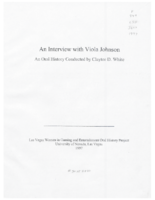
Transcript of interview with Viola Johnson by Claytee D. White, March 12, 1996
Date
Archival Collection
Description
Interview with Viola Johnson conducted by Claytee D. White on March 12, 1996. Johnson lived in a tent when she moved from Fordyce to Las Vegas in 1942. She describes working conditions for maids and the Culinary Workers Union Local 226 strikes between 1969 and 1984.
Text
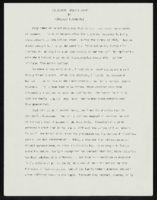
"Collecting Family History": article draft by Roosevelt Fitzgerald
Date
Archival Collection
Description
From the Roosevelt Fitzgerald Professional Papers (MS-01082) -- Drafts for the Las Vegas Sentinel Voice file. On Black families in the United States and family reunions.
Text
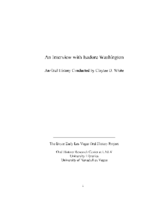
Transcript of interview with Isadore Washington by Claytee D. White, February 7, 2008
Date
Archival Collection
Description
Interview with Isadore Washington conducted by Claytee D. White on February 7, 2008. Born in Tallulah, Louisiana, Washington came to Las Vegas with his family in 1942 at the age of eight. He recalls playing with Wayne Newton when they were children and life on the Westside. Washington joined the sheriff's department after high school and became the first black deputy sheriff.
Text

Transcript of interview with Arlone Scott by Glen Ette Davis, July 3, 1975
Date
Archival Collection
Description
Interview with Arlone Scott conducted by Glen Ette Davis on July 3, 1975. Born in Louisiana, Scott moved to Las Vegas in 1951, eventually becoming a hotel maid supervisor. She shares her early experiences of positive race relations among churches in Las Vegas and notes that the Culinary Union improved job opportunities for minorities. Scott concludes with comments on the effects of discrimination and segregation on entertainment and recreation for blacks.
Text
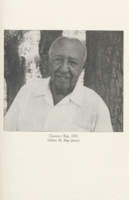
Transcript of interview with Clarence Ray by Jamie Coughtry, 1991
Date
Description
Interview with Clarence Ray conducted by Jaime Coughtry in 1991. Having arrived in Las Vegas in the 1920s, Ray provides a rare perspective on shifts in race relations over the years. He shares stories of early businesses and efforts at organization within the black community. From his arrival, Ray worked to secure equal opportunity and civil rights legislation. During the 1960s, he served two terms as president of the Voters League, formed in 1928 to increase black voting power.
Text
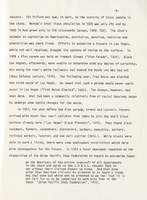
Evolution of a Black Community in Las Vegas: 1905 - 1940
Date
Description
Essay by Roosevelt Fitzgerald exploring the history of the black community in Las Vegas from its founding in 1905 through the 1930s.
Text
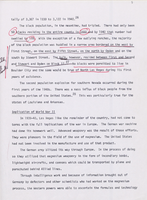
Essay, A Demographic Impact of Basic Magnesium on Southern Nevada, by Roosevelt Fitzgerald, May 12, 1982
Date
Description
Essay by Roosevelt Fitzgerald focusing on demographic changes in southern Nevada from 1940-1945 and the war industry's effect on black employment, particularly the impact of Basic Magnesium, dated 1982.
Text

Transcript of interview with Jimmy Gay by Perry Kaufman, April 12, 1972
Date
Archival Collection
Description
Interview with James A. Gay III conducted by Perry Kaufman on April 12, 1972. Arriving in 1946 from Fordyce, Arkansas, Gay became the first African-American mortician in Las Vegas. He later worked as Assistant Manager of the Sands Hotel and Casino and Union Plaza while serving as an executive board member of the Culinary Union. Instrumental in the Las Vegas community, Gay worked to improved race relations, addressing social, economic, and civic issues. Gay was awarded an honorary degree from the University of Nevada, Las Vegas in 1988.
Text
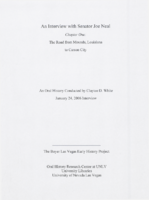
Transcript of first interview with Senator Joe Neal by Claytee D. White, January 24, 2006
Date
Archival Collection
Description
First interview in a series of five with Nevada State Senator Joe Neal conducted by Claytee D. White on January 24, 2006. Born in Mounds, Louisiana, in 1935, Neal joined his family in Las Vegas as a young man shortly before serving in the United States Air Force from 1954 to 1958. Following his military service, he earned a bachelor's degree in political science at Southern University in Baton Rouge, Louisiana. Neal continued his education at the Institute of Applied Science in Chicago, Illinois, with postgraduate work in law. From 1973 to 2001, he served in the Nevada Legislature as the Senator from Clark County Senatorial District No. 4. In the first interview, Neal recalls his childhood, moving to Las Vegas as a teenager, and joining the Air Force. He discusses his early experiences in politics and his involvement in various issues.
Text
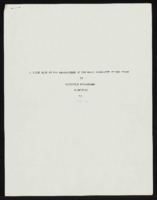
"A Brief Look of the Development of the Black Community of Las Vegas": manuscript draft by Roosevelt Fitzgerald
Date
Archival Collection
Description
From the Roosevelt Fitzgerald Professional Papers (MS-01082) -- Unpublished manuscripts file.
Text
